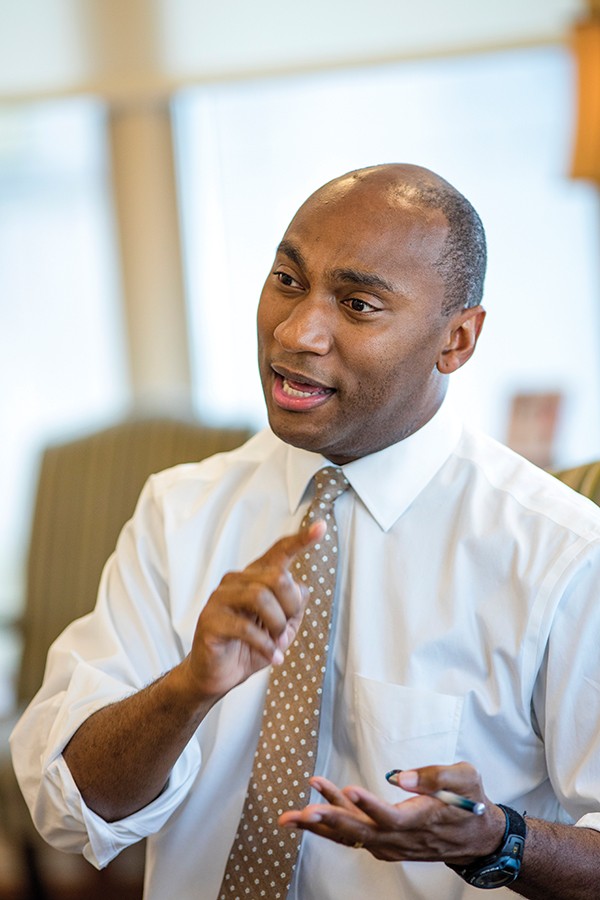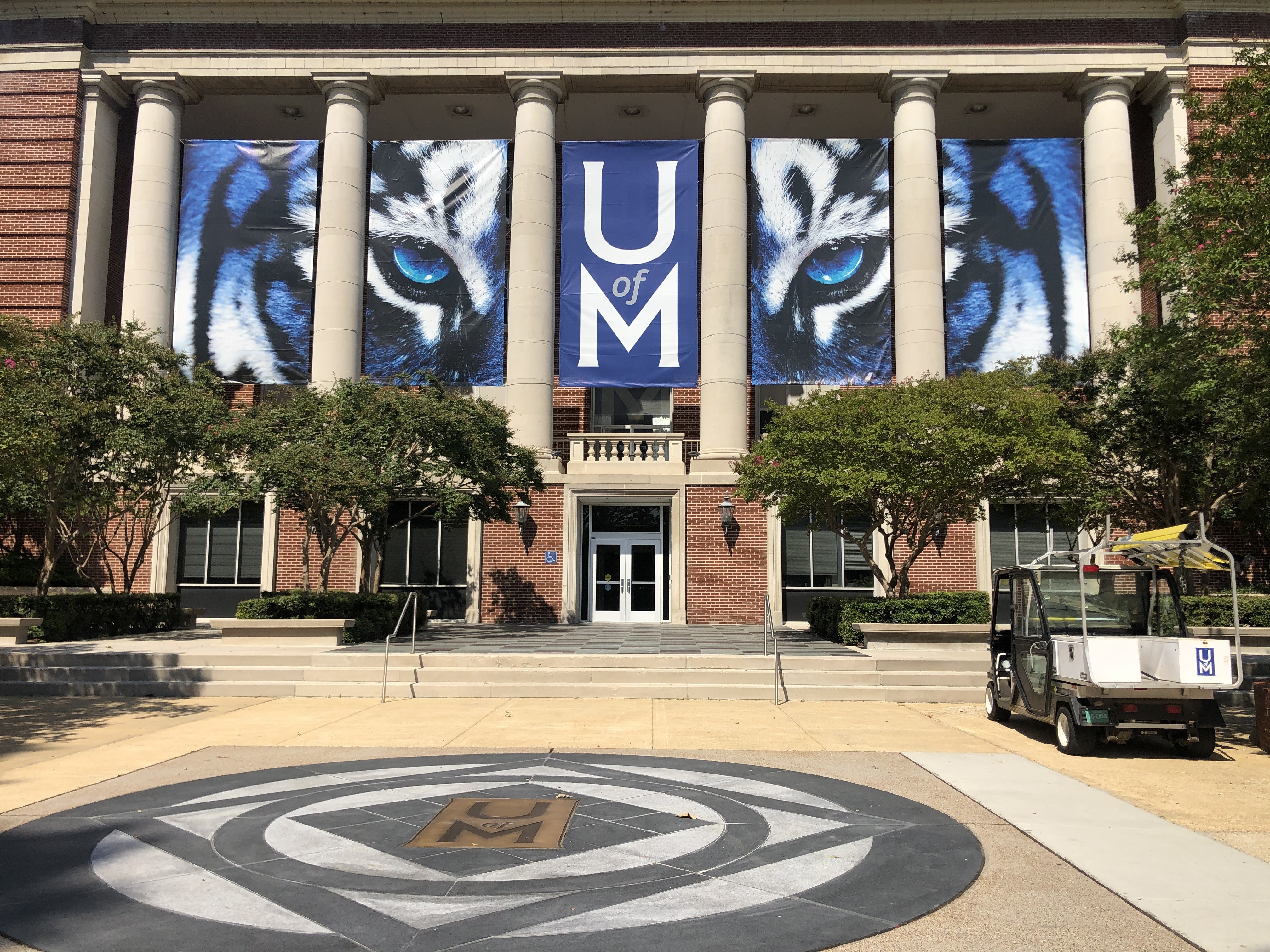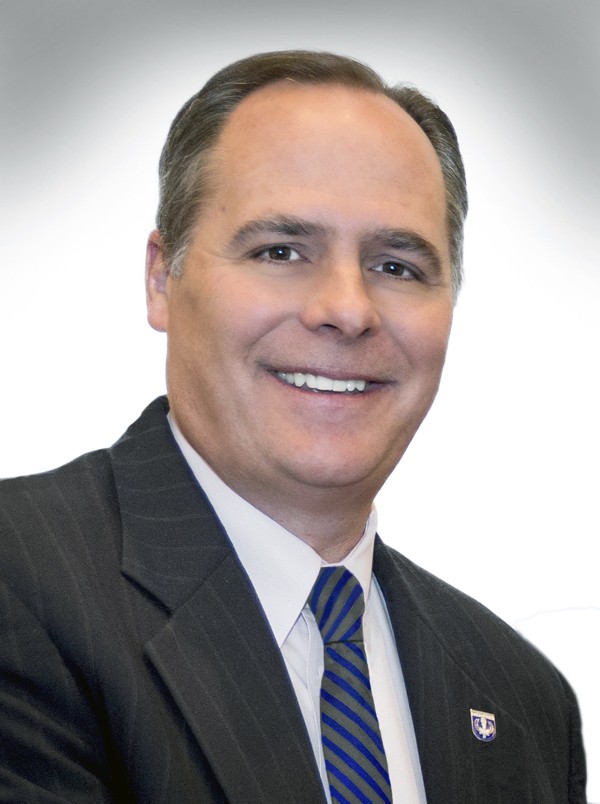Even as most local attention begins to focus on the ongoing city election campaigns, including a multi-candidate race for Memphis mayor, another mayor, namely Lee Harris of Shelby County, is suddenly generating public attention — and controversy.
As the work week began, two actions taken by Harris were front and center in the public discourse. The first was the mayor’s announced decision to veto a budget appropriation of $1 million to the University of Memphis for renovation of the university’s swimming facilities, the Michael Rose Natatorium.
Reprising a debate that was held by Shelby County commissioners during budget deliberations and reinforcing his own call for a $15-an-hour minimum wage for public employees, Harris noted that the university still maintains a top minimum of $11.01-an-hour for some 330 employees.
 Justin Fox Burks
Justin Fox Burks
County Mayor Lee Harris
“I believe issues of poverty that continue to persist in our community are interconnected to decisions like this one,” Harris wrote in a letter announcing his decision. “Most of the University of Memphis employees in question are women and most are African-American. Many of these workers, no doubt, have children and families who rely on their work.”
Taking note of the University’s incremental raises toward the $15-an-hour goal, Harris held out hope that it should and could be reached. “If we all work together, with level heads and open minds, I trust we can identify a plan and timeline to solve this issue. However, until then, I cannot endorse this budget allocation to the University of Memphis. I realize that my stance here may create some consternation, which is not my intent. I take this stance after deliberation, and I am trying as best I can to follow my conscience. I know that commissioners will, as always, do the same.”
The U of M president responded to Harris’ veto announcement with a letter of his own, addressed to Harris and made public, in which he recounted what he put forth as the University’s conscientious efforts over the years to raise employees’ hourly wages to the $15-an-hour level.
“We are implementing a plan to increase our hourly wage to $15/hour over the next several years,” Rudd said. “We’re doing so because we believe our employees deserve it, because it’s the right thing to do. Our employees are the foundation of our institution and the reason we’re succeeding. We are not doing it because you’ve vetoed $1M in support for the Michael Rose Natatorium. We will do so in a manner that doesn’t threaten the financial stability that we’ve worked so hard to attain, or result in dramatic tuition increases that threaten the success of our students and economic growth of the Memphis region.”
Opting to consider Harris’ letter as offering a quid pro quo fraught with “ethical” issues, Rudd concluded, “[W]e’ll continue with already implemented plans to increase our hourly pay scale, and we’ll do so in a manner that doesn’t raise questions about our compliance with accreditation standards. I appreciate your willingness to provide support for the Michael Rose Natatorium. Given the request to directly influence University policy in exchange for the funding, I will have to decline the support.”
Commissioner Van Turner, the County Commision chair, said the commission would have an opportunity to override the mayoral veto on July 22nd and predicted that the votes would be on hand to do so. But he foresaw conversations occurring in the meantime involving the university, the commission, and Harris that could result in a compromise solution.
“I think President Rudd has a plan to get to $15-an-hour that the mayor isn’t fully aware of, but I think he will come to be aware of it,” Turner said. “I think we can reach an agreement and be able to solve the veto matter amicably.”
Indeed, Rudd and Harris would later exchange messages indicating that they could agree on a new U of M initiative stepping up the university’s goal to reach the $15-an-hour plateau within the next two years.
That could obviate any head-on collision on July 22nd. Commission sentiment had been mixed in any case and contradicted any assumptions of a party-line vote providing an override. Commissioner Tami Sawyer, a Democrat and a candidate for city mayor, had said she was offended by Rudd’s manner and would vote to uphold Harris’ veto. Sawyer said the University head’s letter was “disrespectful” of county government prerogatives and of Harris’ position. “It was just this side of calling him [Harris] ‘uppity,'” she said.
Conversely, Mark Billingsley, a Republican, had said he intended to override the veto and had predicted that other Republicans would do as well.
A Bombshell Endorsement
Meanwhile, a number of commissioners expressed bewilderment privately at another surprise move on Harris’ part, his public endorsement over the weekend of District 6 City Council candidate Davin Clemons. The endorsement, accompanied by a $500 campaign donation, was made through the auspices of the Tennessee Voter Project, a PAC founded by Harris.
To begin with, it qualifies as something of a bombshell that the head of Shelby County government should intervene so directly in a city election. Secondly, Clemons, an openly gay police officer/minister who has served as the MPD’s liaison with the LGBTQ community while simultaneously filing a discrimination suit against the department, is not widely regarded as being competitive in the Distrct 6 race.
Most importantly, Harris’ endorsement of Clemons puts him in direct opposition to Edmund Ford Sr., the former holder of the District 6 seat who is the odds-on favorite to regain it, and who is supported by several members of the commission. The mayor’s action is sure to exacerbate his already strained relations with Commissioner Edmund Ford Jr., the council candidate’s son who succeeded his father for two council terms of his own. The junior Ford has been openly critical of several of the mayor’s actions and recently told Harris in open session, “I can’t respect you.”
That remark was in reaction to a quip made by Harris in a TV interview in which the mayor blamed his problems with Commissioner Ford on the fact that he had beaten two members of the extended Ford family in previous election contests. Harris’ support of Clemons against Edmund Ford Sr. is unlikely to defuse any hard feelings on the part of the Fords.
It is taken for granted by those who know Harris, who served abbreviated terms as a city councilman and state senator before his election as county mayor last year, that his ultimate ambition is to serve in Congress. He actively considered a Democratic primary race against 9th District Congressman Steve Cohen in 2016 before opting not to. The mayor’s current actions — and the response to them — could impact that race or any other potential political ambitions he may have in mind.



 University of Memphis
University of Memphis 

 Justin Fox Burks
Justin Fox Burks 
 CIT
CIT 
